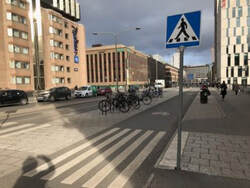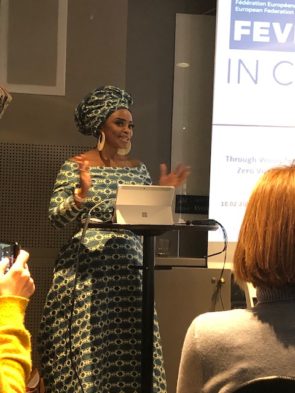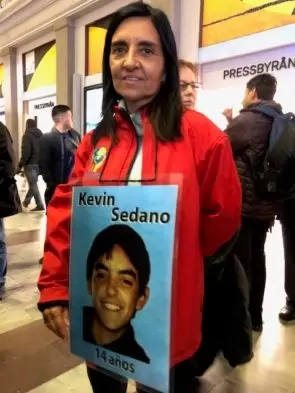|
Check out my article A Local Advocate's Reflections: Leading with the Human Experience in Vision Zero Network! click here! Here I sit, inside my NYC apartment, mere blocks away from the usually bright lights, steady traffic and uninterrupted action of Times Square. I am dumbfounded by the absence of cars and masses of people. When I dare step outside, I see wide-open, empty avenues (something many of us dream about) and only sporadic passersby, mostly donning gloves, masks and a facial expression of bewilderment and fear. My work laptop perched atop my lap, I try to bring my mind back to Stockholm, Sweden, where I participated in the 3rd Global Ministerial Conference on Road Safety, just one month ago, well before my city and the world became forever changed because of the coronavirus pandemic. While my copious notes, the chock-full program and all of the other valuable materials I collected in Stockholm remain physically distanced from me, back at my Transportation Alternatives office, my phone dings with whatsapp messages from around the globe — Africa, India, Spain and more, reminding me of my greatest take-away from the conference — the power of victim/survivor advocates coming together and the importance of our presence in local and global policy making.  Eager to maximize my participation in the conference, I woke early the day before it started and enjoyed a long walk on the Stockholm streets, smiling in awe of the wide bike lanes, pedestrian promenades and efficient busways. I was making my way to some of the conference pre-events — and I’m so glad I did. Though a bit jet-lagged, I was energized hearing speakers from the World Health Organization and the World Resources Institute talk passionately about the epidemic of traffic violence from a public health angle, something we don’t hear nearly enough in the US. I also loved learning more about Vision Zero in Sweden, the International Federation of Pedestrians – and, of course, chatting over fika and smorgas with traffic safety thinkers from around the globe.  The most captivating and powerful speaker I heard that day, and throughout the conference, was Zoleka Mandela, at the official European Federation of Road Traffic Victims, or FEVR, pre-event. I was captivated not only because she is Nelson Mandela’s granddaughter, but because hers was one of the only victim/survivor voices in the main program. With the same grace, poise and firmness of her grandfather, Zoleka shared her personal story of losing her daughter to traffic violence and spoke directly to decision makers, ensuring it was crystal clear to them that there is no excuse for the inaction that continues to rob innocent lives when known solutions are right in front of us. She called for intensified pressure so that no other life is lost or family put through similar pain and suffering.  The next days, I sat in the packed auditorium listening to ministers and leaders from around the globe. It was thrilling to be in a space devoted to road safety, but I was surprised by the absence of personal stories. I believe each session of these conferences should begin with a one-minute dedication and personal profile of an individual who was killed or injured. Fortunately, the passion and commitment of victim advocates are unstoppable, and the Global Alliance of NGOs for Road Safety invested a tremendous amount of time and energy to offer engaging public displays, programs and side-events as part of the #CommitToAct campaign. It was a powerful coming together of this global network for raising public awareness, sharing tears, learning from each other and strengthening our collective voice to end this epidemic, which unlike Coronavirus, has known remedies. While proud of our work at Families for Safe Streets in NYC, I was conscious of being from the U.S., the one country that refused to sign the Stockholm Declaration, a global pledge to eliminate road deaths by 2050. This served as yet another reminder of how important local advocacy is — on everything from influencing street design to representing post-crash victims’ rights. I often find that some of my greatest takeaways from large conferences happen in the informal settings. Walking out of the auditorium and into the main hall, I felt the energizing presence and power of close to 1,700 people from all over the world focused on road safety. While it sometimes felt like a sea of men in dark suits, I loved how gravitational pull somehow brought us advocates together again and again. Looking back, I realize that networking and learning from others were made all the better by seemingly small touches that reflected thoughtful and efficient systems-planning. Dozens of tall carts, each holding hundreds of beautifully plated meals were scattered throughout the room, ready for 1,700 people to easily grab and enjoy without waiting on line. Each simple plate had an attachment for securely holding a glass: It was smart. It was efficient. And it was designed with humans in mind, just like the pedestrian promenades, bike lanes and streets outside. So, in addition to reaffirming the power of victim/survivor advocates coming together, both for mutual support and to inform policy change, I left this international Vision Zero gathering in Sweden reminded of how valuable and beautiful thoughtful planning can be, especially when the human experience is the driving force. This is the final part in a five-part series sharing perspectives from various participants in the 3rd Global Road Safety Conference in February 2020, which set the goal of halving traffic deaths globally in the next 10 years. Read the full series here. Chana Widawski is the inaugural organizer for Families for Safe Streets. A social worker with over a decade of experience working with victims and survivors of crime, Chana is also a four-season cyclist, environmental activist, and neighborhood organizer. She serves as Adjunct Faculty at Hunter School of Social Work.
0 Comments
|
Chana WidawskiA social worker…..working socially, around the globe. Archives
August 2020
Categories
All
|
 RSS Feed
RSS Feed